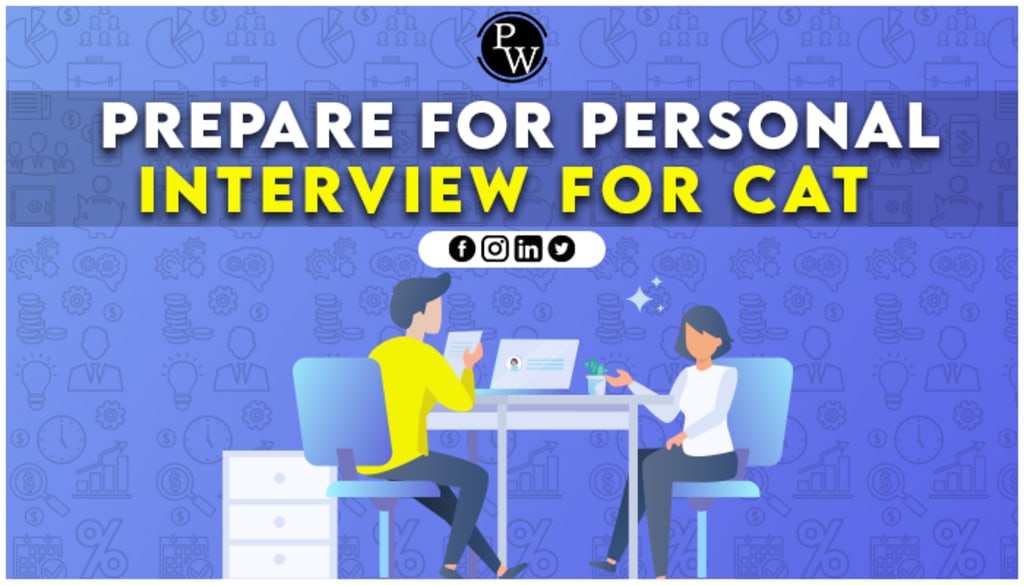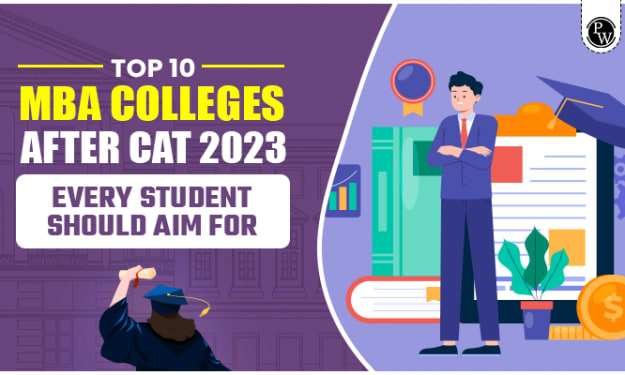10 Important Questions You Must Know Before CAT Interview / Physics Wallah
10 Important CAT Interview Questions

The common Admission test (CAT) is the doorway examination for aspiring candidates who choose to make a profession in management and business management i.E. MBA. This exam is conducted by the Indian Institutes of control (IIMs) on a rotational foundation.
Giving the CAT examination will place you on the short track to career advancement by way of offering you the chance to increase a wide range of trendy business expertise and a wide base of technical talents in a quite short period .Here is 10 most important question you should know before the CAT Exam.
Ques - 1 Tell Me What Is Written In Your Cv? …
Ans - The following sections includes in a traditional CV:
- Contact Information
- Resume Summary or
- Objective
- Work Experience
- Skills
- Education
If you have included these sections in your CV but haven't filled it out completely, you can also include some optional sections like:
- Languages,
- certifications,
- publications (if you're a writer or academic),
- Hobbies,
- Interests,
- training awards,
- volunteer experience,
- projects, and
- extracurricular activities
are optional sections that are especially helpful for recent graduates without prior work experience.
You can demonstrate that you have some experience working in a team and getting things done, even though you do not have any real-world work experience, through sections like extracurricular activities or projects.
Ques - 2 What Did You Learn at Your Graduation?
Ans - Life-changing lessons that a typical college student acquires during their college years.
1. The importance of time management is one of the most valuable life lessons you can learn in college. You are all aware that tides and time do not stand still, and the campus experiences will provide you with a platform for a live lecture on time. You'll also learn that time flies by so quickly that it's better to enjoy each moment than dwell on the ones you've missed.
2. Communication is always the key to resolving many problems and saving many relationships in life. Proper communication can improve situations. This is the key to better self-expression and comprehension of others.
3. Don't be afraid to try new things in your life. It's high time to try new things. You'll learn that it's okay to take small risks in life if the results are overwhelming during college. That's when they start learning how to use new machines or vehicles or try a new sport, which might be hard at first.
Ques - 3 Why Mba?
Ans - If you get your MBA(Masters Of Business Administration) from a prestigious business school like Harvard, Stanford, Kellogg, or Wharton, you will benefit greatly. It may result in increased compensation and better career opportunities. But that is not all. The following are the top reasons to get an MBA:
Better pay and a better career path Better demand for MBAs in
- specific fields
- Networking opportunities
- Entrepreneurial skills and
- knowledge development
- Managerial skills development
- Overall personality development
- Increases confidence and brand building
- No age limit
- Opportunity to relocate
When responding to the final interview question, you must demonstrate confidence and precision. To prepare for such interview questions and provide thoughtful responses, you can follow the suggestions provided below:
Examine the Job Description Because it explains the company's expectations of the applicant, you must pay close attention when reading the description. As a result, reading and analyzing the job description will assist you in preparing to respond to inquiries such as "Why are you a good fit for this job?"
Before appearing for the interview round, conduct research about the company, including its objectives and mission. Official websites also provide a glimpse into the company's culture. You'll be able to use it to answer interview questions by identifying aspects of the company and your approach to the future that is similar.
Be as specific as possible when describing your accomplishments and qualities that make you a good fit for the company. If you say that you are good at programming, for instance, give an example of a time when your ability to program helped your current or previous employer solve a major problem.
Ques - 4 Which aspects of your previous job did you find most enjoyable and least enjoyable?
Ans - Approaching the question in a positive, casual manner and naming one thing that you felt could have been better while also naming some positive aspects of the job is the best way to answer what you liked least about a recent job.
So you start by answering their question directly, but you don't go into too much detail and don't whine or criticize too much. You always want to show that you can remain upbeat and enthusiastic at work even when things aren't perfect.
The employer will feel a great deal more at ease hiring you if you respond in this manner. Employers are afraid to hire people who will be negative or who will become depressed or discouraged if things get tough at work.
Therefore, even if you didn't like your job, your answer strategy will demonstrate your resilience and positivity.
Ques - 5 Describe a time when you failed or made a mistake and how you handled it.
Ans - How to compose your response is as follows.
1. Choose a true failure.
The first step is to select an error. Don't try to get out of this by talking about that one time in college when you got a B. You are deceiving no one. At the same time, you probably want to avoid making any huge mistakes when it comes to the kind of job you're applying for.
For instance, if you are interviewing for a position in account management, maybe you shouldn't tell them about the time you lost your largest client to a huge fire.
2. Utilize your own words to define failure.
Define failure in a way that fits your story after you've chosen it. Your story no longer needs to be an obvious failure once failure is defined; It doesn't matter what you mean by failure; this reveals to the interviewer how you approach your work.
Three examples of how this might sound are as follows:
- "Failure to me is not meeting expectations, both my own and those of others,"
- When I'm taken by surprise, I consider it a failure as a manager. I try to keep up with my team's activities and work.
- I believe that failure is more than simply failing to achieve a goal; it is also failing to accomplish a goal with the resources at your disposal. I consider it a failure if I use up more time or supplies than I was originally given.
3. Share your story.
Begin by describing the circumstance and its challenges. Then describe precisely what you did to try to fix it. Given that this is about failure, you probably won't succeed or only partially succeed. That's okay. Do not attempt to hide the fact that not everything went according to plan.
Don't try to sugarcoat anything because it's impossible to do well in an interview if the interviewer doesn't believe what you say. Additionally, avoid placing blame on others for your failure and ensure that you take responsibility for your actions.
4. Discuss what you've learned.
After you describe the disappointing aspect of your story after your response, you finally get to the good parts: what you've learned.
Discuss the reasons you believe things went wrong, what you would have done differently in hindsight, and, of course, what you will do next.
A few examples of what you might say are as follows:
- The assumption that we would be able to obtain clean data from users was our primary issue. One of my most important takeaways from the experience is this: Never rely on data assumptions. That error has never occurred to me again."
- We could have managed our client's expectations if I had just communicated the first few bumps in the road, but we damaged the relationship because we did not. Now, I never let an awkward conversation prevent me from being transparent about a project's status.
Ques - 6 Why did you quit your previous job?
Ans - Reasons for quitting that are usually appreciated by a hiring manager:
1. An interviewee's desire
To grow professionally and take on more responsibility is something that all hiring managers are looking for. When explaining why you're leaving a job, it's critical to let a potential new employer know if you aren't getting the opportunities to advance and learn in your current position. Give concrete examples of the kinds of skills you want to develop and how you plan to do so.
2. Changing careers- You are not impulsive just because you want to change your professional direction. It could be a sign that you're serious about finding work that makes you happy. You can demonstrate your drive and commitment by laying out your career development strategy and ultimate objective.
3. Relocation - Sometimes, the desire or necessity to relocate can provide a satisfactory explanation for why you are leaving your current position. This would be the case if you believe that the best way to relocate is to move near the potential employer's office rather than asking your previous employer for remote work, which they may or may not honor.
Ques - 7 Describe the reasons you're moving, the skills you can bring to the company, and the advantages you see in a new job and location.
Ans - A hiring manager who needs their team in or close to the office perhaps impressed if you can demonstrate that you have the drive and determination to establish new roots in an era when many candidates want to work from home.
Ques - 8 Do you want to go back over any of the first interviews?
Ans - During the first interview, candidates frequently regret an answer they gave to a question. Give them a chance to elaborate on their perspective or completely revise an earlier response.
The candidate will feel more at ease if this question is promptly, particularly if they had been dwelling on an answer from the previous interview. They will be able to concentrate on the second round of interview questions because of this.
Ques - 9 Which management style do you prefer?
Ans - Style of Persuasive Management -
As a manager, you will always be in charge and control. However, managers occasionally encounter issues that can be resolved through brute force.
For instance, the company might enact a new rule, and as a result, you might lose some of your employees. In such circumstances, the manager must employ a persuasive management style to explain to employees the benefits or the reasoning behind a decision.
While also accomplishing the objectives of the organization, this method of management can assist in maintaining workplace harmony.
Ques - 10 What do you anticipate earning?
Ans - You need to list your salary expectations on some paper and electronic applications. Simply ignoring this question is one option.
However, if you don't answer the mandatory question, the employer might think you don't follow directions well. You won't be able to move on to the next page of some online applications until you have answered all of the questions.
In this scenario, there are a few choices:
- Create a range of salaries based on your research.
- To demonstrate your adaptability, write a phrase like "negotiable."
- Avoid specifying a single salary.
- This will give the impression that you are unwilling to compromise.
About the Creator
Shubham Meshram
Teacher At Physics Wallah
https://www.pw.live/mba






Comments
There are no comments for this story
Be the first to respond and start the conversation.